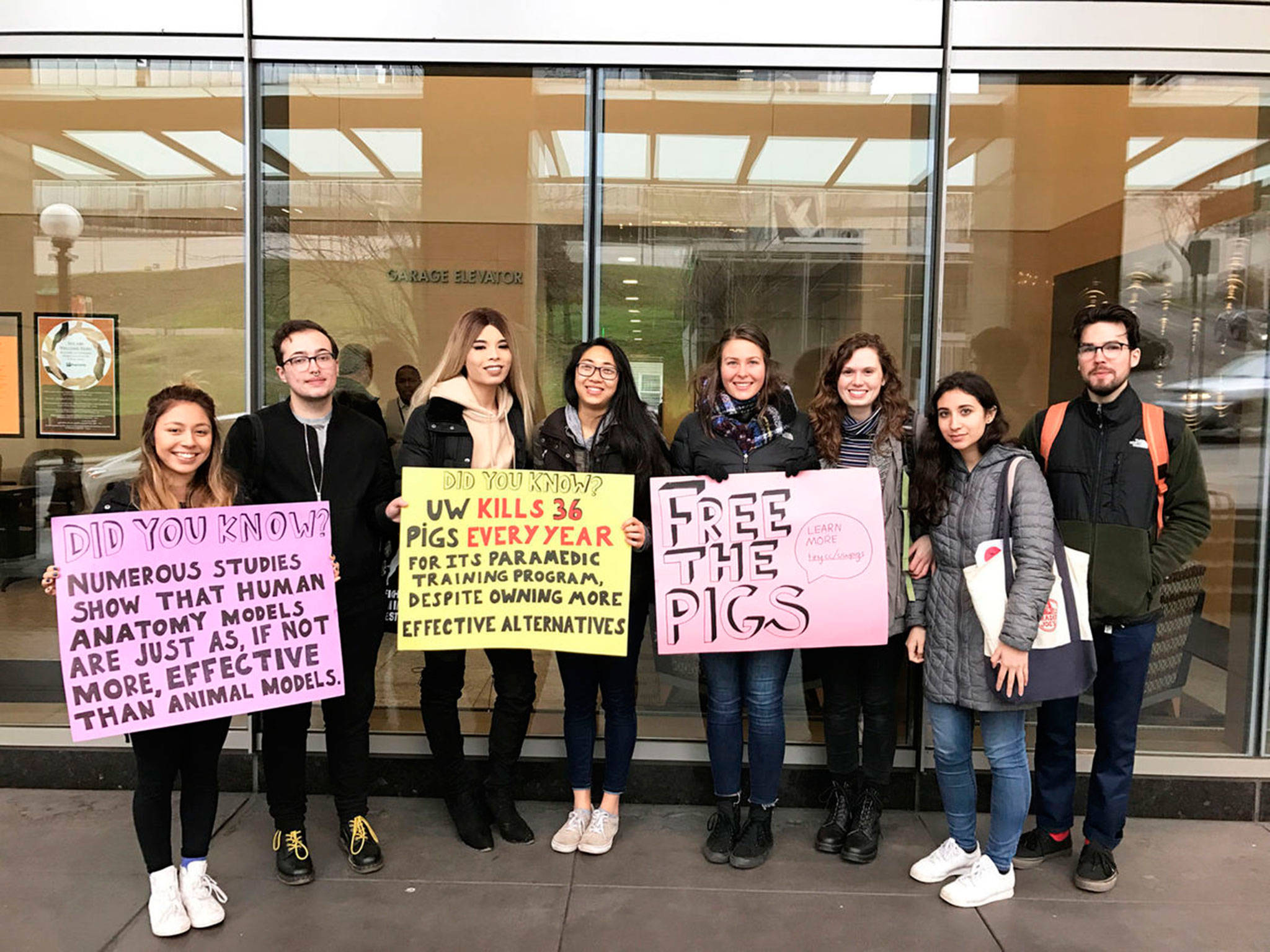For close to three years, Sequim grad and current University of Washington student Victoria Cummins has worked with animal advocates to push for a change to the university’s paramedic training program.
Their goal: stop more than 30 live pigs from being used each school year in a training procedure for opening airways in life-threatening circumstances.
Cummins, a junior double majoring in business and comparative history of ideas, volunteers with the university’s Campus Animal Rights Educators (CARE) club, advocating for vegan food options on campus and humane treatment of animals within medical testing in the school’s science labs. The club also promotes a safe place for non-vegans, vegans and vegetarians to come together.
The university’s campus paper “The Daily” reported on Dec. 6 last year in its story “CARE protests UW paramedic training program’s use of pigs” about the students’ efforts.
Cummins said they want the King County’s Medic One Paramedics program through the college to stop performing cricothyrotomy on anesthetized pigs where students insert a tube in the pig’s throat to create an airway.
According to a 2016 report by the Physicians Committee for Responsible Medicine, UW’s School of Medicine Paramedic Training Program has used live animals since the late 1970s.
Cummins said 30-40 pigs through the school year are still being secured on their backs while students practice making incisions on the trachea because they have similar cardiovascular systems to humans. The pig dies after the training, Cummins said.
CARE members say there are alternative simulator models that can replicate the procedure.
Cummins, who has been helping lead up to 20 club members with making phone calls, sending emails, canvassing, researching and more, said there are more than 100 paramedic programs west of Texas that use simulator models.
“It’s so unnecessary so why are we still doing it?” she said.
Cummins said leading up to meetings with King County and university administration, CARE members received 1,125 signatures from students, staff and alumni asking the university to stop using pigs.
“We wanted to show them that the UW community doesn’t support the program’s use of pigs and here are some students who don’t support what’s happening,” she said.
Phase out
Cummins said she and fellow CARE members met with staff for King County Executive Dow Constantine in December and were told that the previous 2020 deadline to switch to a simulator program was determined too long.
Just when the deadline was bumped to hasn’t been revealed to the club, she said.
“The good news is they are going to phase the pigs out,” Cummins said.
Once a date is shared, Cummins said CARE will ask for next steps.
“Ideally, we feel they should be implementing a new simulator model by this summer quarter (when paramedics begin the first quarter of the year),” she said.
“The Daily” reported that the paramedic’s program leaders said the pigs have similar tissue as humans and it replicates the stress of doing the procedure on a live animal. Program leaders were also reported preferring to develop their own simulator model prior to switching over in 2020.
“Even if you want to make your own simulator model, then you should be using the current simulator model until then,” Cummins said.
Tina Mankowski, a spokesperson for UW Medicine/Health Sciences, said a prototype simulator is anticipated to be developed by the end of year and full training with a simulator implemented by January 2020.
“However we will be looking for funding to pay for the construction of the simulators once we have them developed,” she said.
CARE members have delivered letters and the petitions asking for a quicker changeover to the offices of Constantine, UW President Ana Mari Cauce and chief medical officer of UW Medicine Carlos Pellegrini.
“We took the position with (Cauce) that it’s time for you to act,” Cummins said.
She said Pellegrini responded via letter thanking them for their concern but did not offer any changes.
Back home
In Sequim, Cummins said she decided to pursue a vegan lifestyle after seeing a video on social media about industrialized farming.
She’s found vegans and vegetarians no matter where she’s been even in Sequim.
“It wasn’t until I went to school in Seattle that I understood a larger social system of how things work and how animals are raised for food commercially,” Cummins said.
In Seattle, along with her studies, she’s also focused on solving problems with worker exploitation, food inequality, environment degradation, and much more.
When she does make it home to Sequim, Cummins said she’s “constantly talking to people about vegetarianism or veganism.”
Her Sequim family has been real supportive of her efforts too, she said.
“Since I was little, I’ve always questioned things,” Cummins said.
“My mom and grandma have always been so so supportive. We always have vegan dinners. They’re always willing to support me when they can.”
For more on CARE, visit facebook.com/UWCARE.
Reach Matthew Nash at mnash@sequimgazette.com.



